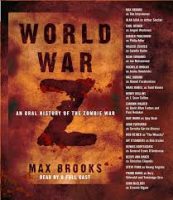 Daniel reviews WORLD WAR Z by Max Brooks, 2006, Crown Publishing Group, 342 pages.
Daniel reviews WORLD WAR Z by Max Brooks, 2006, Crown Publishing Group, 342 pages.
People Matter!
(Reviewer’s notes: Yes, Brad Pitt starred in a 2013 zombie flick named World War Z that had all the qualities of a cooked pair of khakis, but the name of the film and the presence of zombies are the only things they have in common. Bear with me!)
In the early 2000s, Max Brooks (the authorial son of famed filmmaker Mel Brooks) was seeing bookstores rife with non-fiction survival books: how to survive global warming, how to survive being shipwrecked on an uncharted island, how to survive the nuclear apocalypse, et cetera. What he didn’t see were books about how to survive the inevitable uprising of the un-dead, so he published The Zombie Survival Guide in 2003. This work assumes the existence of a viral-based plague that reanimates those who die infected, and then applies non-fictional survivorism logic to that scenario. Brooks treats the material with 100% seriousness, and reading the book truly leaves one feeling ready for the end.
World War Z (WWZ) is presented as a collection of oral histories from survivors of that same plague. The premise is: the world was infected by the aforementioned virus, humanity fought for years, nearly lost, and then we finally routed most of the un-dead. In the novel’s present, humanity declared victory 20 years ago, and an unnamed UN researcher is tasked with surveying the world and learning from the survivors; WWZ is his product.
Essentially a collection of interrelated short stories, Brooks has organized them in roughly chronological order, but the who, where, and why of the individuals’ stories aren’t connected. They instead build the world of the infected for the reader through narrators of varying reliability. For example, the first story is told by a Chinese-government virologist who believes he was the first to encounter the un-dead.
If you’ve seen a zombie film, then your expectations are way off. World War Z isn’t about the zombies, it’s about the people; it’s about humanity. How would we respond? How would the different kinds of people, the different societies and beliefs among us, how would they react? How would the Islamic/Jewish dichotomy in the Middle East react to an outbreak of the un-dead? If infrastructure collapses, what happens to cosmonauts in orbit or the submarines on missions which render them incommunicado? What about the corporations, governments, and corporate-governments of the world? These institutions are driven by people, and Brooks puts believable people—especially those with backgrounds you’re unfamiliar—into your hands, and they tell you their stories.
As a veteran, I understood the panic of conventionally-trained soldiers who were expected to deliver shock-and-awe to an implacable enemy that can neither be shocked nor feel awe. As an American who grew up in the suburbs, I understood the desire to disbelieve that which can disrupt mundanes and instead embrace the broadcast platitudes. As a person living through COVID-19, I understand corporations feeding from ignorance and fear, I understand politicization versus science and experience, and I understand how social stratification unevenly affects lifestyle, options, and survival. Who among Brooks’ dozens of survivors will you identify?
World War Z feels eerily familiar today, and serves as not only a reminder to question what we’re reading and watching every day, but also a reminder of other people and how their experiences aren’t ours, but we’re all suffering.






